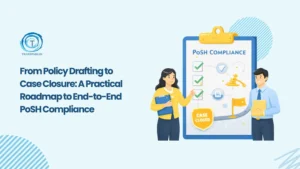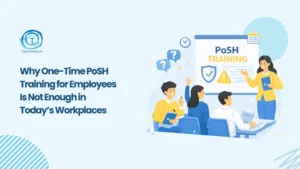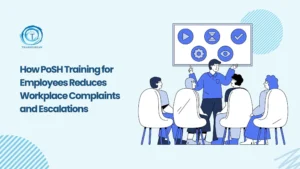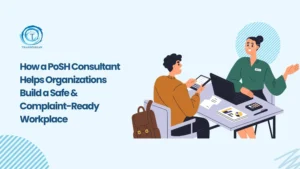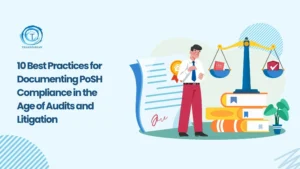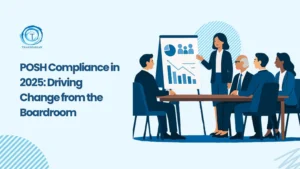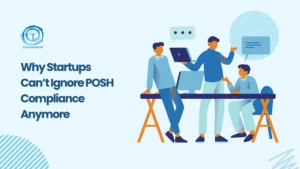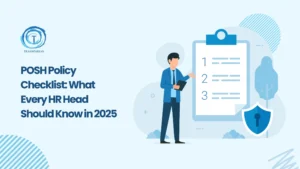Ensuring PoSH compliance is not merely a statutory requirement but a moral and cultural imperative for organizations in India. Even though most of the firms declare to be complying with the POSH Act, 2013 often, they fail to do so without any recognizable error. Such errors may put the businesses on the hook of legal liabilities, tarnish the business, and affect the safety of the workers.
In this blog, we’ll explore 5 major mistakes companies make during POSH compliance including key areas that are often overlooked. Be it an HR leader, a compliance officer, or a business owner, awareness of these landmines can come in handy to create a truly safe, inclusive and compliant workplace.

1. Improper Constitution of the Internal Complaints Committee
Another most critical element of PoSH compliance is composition of a valid internal complaints committee (ICC). The POSH Act requires all organizations above 10 employees to constitute an ICC and have at least one external member, ideally a posh consultant or a reputed NGO specializing in women rights.
Unfortunately, many organizations:
- Fail to appoint an external ICC member altogether
- Do not include a woman presiding officer, especially from senior management
- Keep expired tenures or inactive members on the posh committee
The gaps in these structures lead to poor investigations. This can cause complaints and penalties for non-compliance to be invalid. A compliant posh committee must be formally notified, accessible to employees, and trained regularly through posh training programs to handle complaints with neutrality and empathy.
2. Superficial or Irregular POSH Training for Employees
Possibly the second most frequent error is making posh training a once-in-a-blue-moon affair or not having it at all. The law focuses on periodic sensitization workshops as a way of ensuring that the employees are conscious of their rights, duties, and ways of redressing grievances.
Common missteps include:
- Conducting POSH awareness training only during onboarding
- Relying on generic slide decks without contextual examples
- Not tracking attendance or effectiveness of posh sessions
- Excluding third-party staff, gig workers, or interns from training
The process of building quality posh among employees would take the form of an interactive course that exists in scenarios and with references to real life. Conducting periodic posh workshops with professional facilitators improves knowledge retention and encourages a culture of zero tolerance for workplace harassment.
It is important to teach less-known forms of posh. These include mental harassment at work, verbal misconduct, bad jokes, and disaffection. These topics should be part of ongoing POSH training.
3. Ambiguous or Outdated POSH Policy Documentation
Although the majority of the companies have already established the POSH policy, they still do not pay much attention to the creation of definite POSH documents, which should be current and practical. An obsolete document or template that does not tailor to the organization leads to misinterpretation and poor execution.
Key issues include:
- Not defining different types of workplace harassment, including mental harassment at workplace
- Vague complaint procedures that are hard to follow
- Missing escalation matrix and timelines for resolution
- Policy not translated into regional languages for wider access
To ensure good PoSH compliance, you should update your PoSH documents every year. Revise them to match any changes in the organization. This involves refreshing the internal complaints committee members, timelines and contact details.
Displaying the policy on notice boards, intranet portals, and HRIS platforms makes it visible and accessible two qualities essential under POSH rules.
4. Mishandling of Complaints and Lack of Confidentiality
Complaints mismanagement is not just a legal hazard but an employee trust-break too. A large number of HR teams, managers or ICC members incur the breach of the process unintentionally through:
- Failing to acknowledge complaints in a timely manner
- Initiating biased or informal investigations
- Disclosing identities of complainants or accused parties
- Not maintaining detailed minutes or evidence during inquiry
This kind of error contravenes the tenets of natural justice and in most instances it leads to appeal or lawsuits. In a posh firm, these main priorities must be on confidentiality, neutrality, and the integrity of the processes.
Documenting every step from complaint receipt to final report is part of mandatory posh documentation. This can be simplified through digital complaint portals and logs ready to be audited to be accountable.
It’s also important to remember that internal policy must strictly prohibit and penalize retaliation or negative consequences against complainants and witnesses.
5. Ignoring Audit, Reporting, and Cultural Integration
Even those organizations which fulfill the fundamental obligations of PoSH compliance tend to ignore the greater penetration of gender sensitivity into the workplace functioning. When the PoSH Act is treated as a formality, the following is the outcome:
- No regular audits or review of POSH documentation
- Non-submission of annual reports to the District Officer
- Ignorance of how PoSH intersects with performance reviews, promotions, or grievance redressal
In addition, most companies do not establish safe zones where open communication can be made. What formal complaints do not capture can be uncovered via feedback loops after posh training or poSH workshops, anonymous surveys and employee-posh committee interaction on a regular basis.
Leadership accountability is also a factor as it comes in the form of cultural integration of posh rules. CXOs and department heads should participate in posh sessions not just as figureheads but as active endorsers of the anti-harassment framework.
Addressing the Gaps Most Companies Miss
In addition to the top five issues, there are various details that have not been listed in the course of PoSH compliance:
a) Handling Anonymous Complaints
Many companies avoid acting on complaints unless they are signed or formally submitted. While the Act requires written complaints, anonymous inputs should still be tracked, logged, and used for pattern analysis. Such proactive measures will prevent recurring crimes and help instill trust in employees.
b) Vendor and Remote Workforce Inclusion
As the number of remote workers and freelancers are hired, most organizations do not subject vendors, consultants, and workers who are contracted to work with them to the scope of posh awareness training. This is a compliance danger and a culture failure.
Every entity connected to the company should receive some form of POSH training for employees, even if through lighter or digital formats.
c) Startup and SME Challenges
Smaller companies are usually unaware or more simply do not have the resources to institute POSH compliance. However, ignorance is not a legal defense. Startups can consider hiring external posh consultants to set up their first internal complaints committee, develop custom policies, and run initial POSH training programs.
These solutions are scalable and often more cost-effective than dealing with the aftermath of a compliance breach.
The Real Cost of Ignoring PoSH Compliance
While direct penalties under the POSH Act may seem minor, the reputational cost of non-compliance can be catastrophic. Media scrutiny, social backlash, and employee exits are common fallout of mishandled complaints or toxic culture.
Additionally, brands that actively promote their commitment to gender safety and inclusivity are more attractive to both talent and investors.
By avoiding the common mistakes outlined above and addressing the often-missed nuances, your organization can ensure it’s not just a posh company by policy, but one by practice and purpose.
FAQ’s
POSH compliance ensures organizations follow the Prevention of Sexual Harassment Act, 2013, creating a safe and respectful workplace for all employees.
Typical mistakes include improper internal complaints committee formation, irregular POSH training, vague policies, and mishandling complaints.
Yes. Non-compliance can lead to monetary penalties, reputational damage, and even license suspension in severe cases.
Organizations should conduct POSH awareness training at least annually, with additional refreshers or POSH sessions during onboarding and policy updates.
POSH documentation must include policy copies, ICC meeting minutes, complaint records, investigation reports, and annual reports submitted to authorities.
They can engage a certified POSH consultant to help establish policies, form the internal complaints committee, and conduct POSH training programs.


